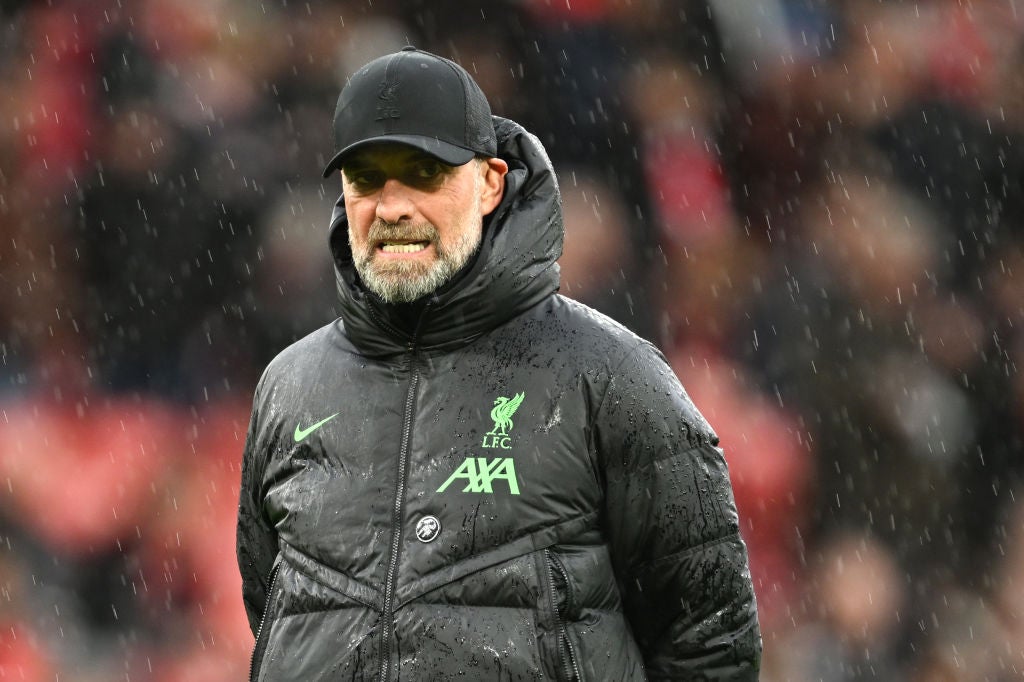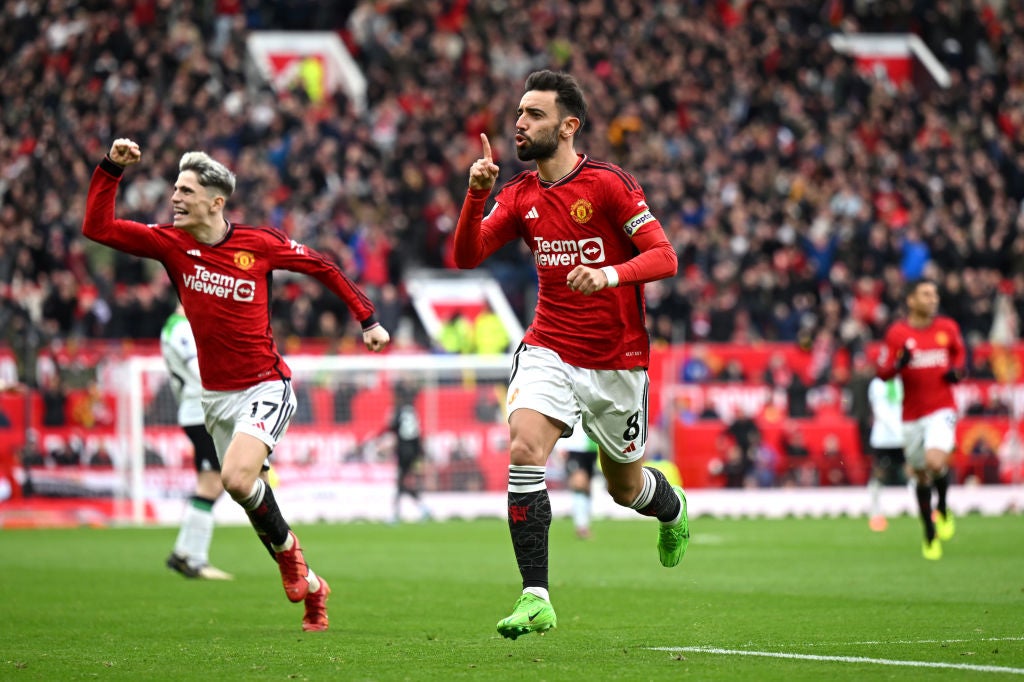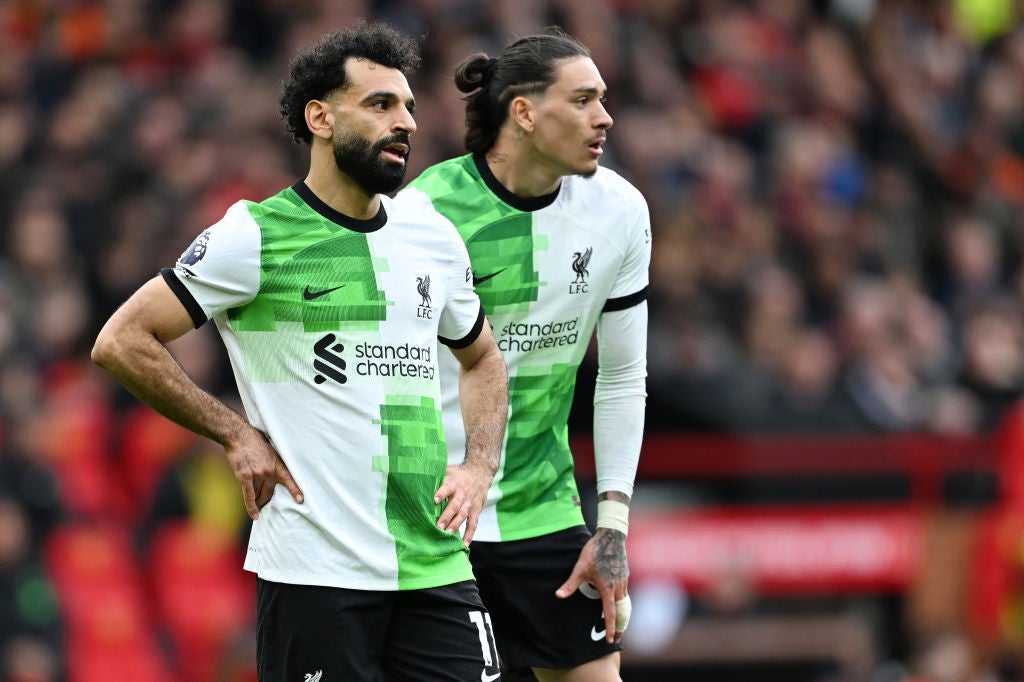What Jurgen Klopp’s mind games say about exhilarating Premier League title race
After dropping off top following a 2-2 draw at Old Trafford, the Liverpool manager looked to put the pressure on the new leaders, Arsenal, as the title race enters its next chapter

Your support helps us to tell the story
From reproductive rights to climate change to Big Tech, The Independent is on the ground when the story is developing. Whether it's investigating the financials of Elon Musk's pro-Trump PAC or producing our latest documentary, 'The A Word', which shines a light on the American women fighting for reproductive rights, we know how important it is to parse out the facts from the messaging.
At such a critical moment in US history, we need reporters on the ground. Your donation allows us to keep sending journalists to speak to both sides of the story.
The Independent is trusted by Americans across the entire political spectrum. And unlike many other quality news outlets, we choose not to lock Americans out of our reporting and analysis with paywalls. We believe quality journalism should be available to everyone, paid for by those who can afford it.
Your support makes all the difference.At this stage of the season, there was only one way to put it. No, not a slip, although that obviously applied to Liverpool’s 2-2 draw with Manchester United. It was about what followed. And it was, yes, a mind game. It was maybe the first in years, after what have been a series of very “nice” races between the managers.
The circumstances made it all the more pointed. Liverpool had just drawn a game they should have easily won, and it raised questions over whether this was going to be a key moment in the title run-in.
Jurgen Klopp was even asked whether this would be another one of those run-ins when there are barely any slips, like 2018-19. If so, it might make these two dropped points against a fragile United all the more consequential. On the other side, however, that would also make Arsenal’s trip to Old Trafford all the more important.
So, Klopp said what sounded a lot like a psychological ploy. He had admittedly been directly asked about Arsenal’s trip to United, but his choice of answer was conspicuous.
“Arsenal is a good football team and if [United] play like today, Arsenal will win that game. I’m 100 per cent sure,” he said.
“I’m really sorry to say that but this is a matter of fact. We should’ve won both games and didn’t. That’s our fault.”
That’s true, but it also has a double effect. It puts more of a pressure on Arsenal to produce when they go to United, obviously. More importantly, it may provoke United to respond, to try and prove to Klopp what they can do in such a game… while at once doing exactly what the Liverpool manager requires.
Many at Old Trafford will of course remember Sir Alex Ferguson repeatedly doing similar.
You only have to look at the most famous moment from any English title race. The prompt for Kevin Keegan’s “I will love it” was Ferguson essentially trying to motivate an opposition side for when they were facing Newcastle United.
It should be stressed it was a lot harder-edged than Klopp, as Ferguson basically questioned the Leeds United players’ motivation. The inference was nevertheless the same: to drive another team to try harder in a title-race match.
“If they had played like that all season, they'd be near the top,” Ferguson said at the time. “They raised their game because they were playing Manchester United. It was pathetic.”
Leeds duly went out and put everything into a game against Newcastle, only to be narrowly beaten.
If this admittedly seems a little too much to be reading into an off-hand response to one unexpected question in a press conference, well, that’s the stage of the season we’re at.

No result or performance can be judged on its own merits any more. Everything is in the context of the run-in.
It’s both exhilarating and asphyxiating. You can feel the tension in every single moment, like when Liverpool had that last attack that Andre Onana collected in the United game.
So it is with the sense of chaos in Liverpool’s games. This has perhaps been the one big doubt regarding their title challenge, to go with the relative youth of their team.
Liverpool, a touch like Arsenal last season, have allowed almost every match to become a football version of table tennis.
This does have obvious positives, mostly related to resolve and attacking potential. Liverpool have enjoyed more comebacks than anyone else. They’ve won more points than anyone else from losing positions this season. You couldn’t rule them out from any individual game, which is a powerful weapon when it comes to a run-in. It can directly psychologically affect games. Again, Ferguson knew that well.
The other side of that is that Liverpool always give you a chance. They haven’t kept a clean sheet since the start of March, at Nottingham Forest, and that was only the second in the league this calendar year. That’s two in 12 games.

The danger is that there’ll eventually be just too many matches where they run out of time, or become too frenetic.
They have mostly used that chaos superbly, which had made their title challenge so emotionally stirring. It offers an almost perfect cap to Klopp’s uplifting time as manager, that has been built on raucous football.
But that’s the key term. “Almost perfect” - not perfect. Liverpool’s great virtue this season has been constantly doing enough to overcome their flaws as a young side, but those flaws are there.
The great question is whether they can keep doing this indefinitely, which is where this question of what kind of a race it will be is so crucial.
Will it be like 2019 from now on in, where you just can’t drop points, or will it be that bit more open?

Whatever the answer, it all forms one reason why Arsenal responded to the chaos of last season by bringing in Declan Rice and shoring up defensively. Mikel Arteta knew they needed much more control of games. It has also given Arsenal a distinctive advantage, in that goal difference.
Weighing over all of this is that it suddenly feels like Manchester City have come to form. Although Aston Villa and Crystal Palace both posed tests, the champions responded by twice scoring four goals. They ultimately asserted control.
Liverpool couldn’t quite do that in the first half against United. They had so many chances, but were not composed enough
And sure, it might have only required one of those shots to go in for us to be talking very differently, but that is the point. We are at that stage of the season where it is ultimately about whether you do it or not, whether you take matters into your own hands or not.
Liverpool couldn’t do it on the day. Klopp, consequently, seemed to try to exert some influence in the aftermath.



Join our commenting forum
Join thought-provoking conversations, follow other Independent readers and see their replies
Comments